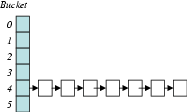Hash Table Attacks

At lunch today, I told Eric about Hash Attacks: for many hash functions, it’s possible to construct a large set of keys that collide. This can be used to cause a Denial of Service as hashtable operations can be induced to take O(n) time instead of O(1).
Crosby and Wallach successfully demonstrated this against a number of applications.
Andrew has a good writeup of Hash Algorithm Attacks.
There are various mitigations suggested. The one that I used when I first became aware of this problem is to use a salt to the hash function.
In other words, change:
unsigned hash(const char* s) { unsigned h = 0; while (*s) h = h * 101 + (unsigned) *s++; return h; }
to:
unsigned hash(const char* s, unsigned salt) { unsigned h = salt; while (*s) h = h * 101 + (unsigned) *s++; return h; }
where salt is chosen randomly when the hash table is created or when the process starts. This should be enough to vary the order in which keys are distributed to buckets from run to run.